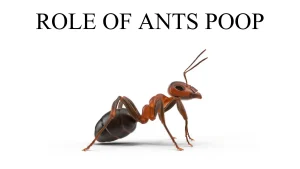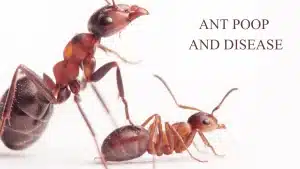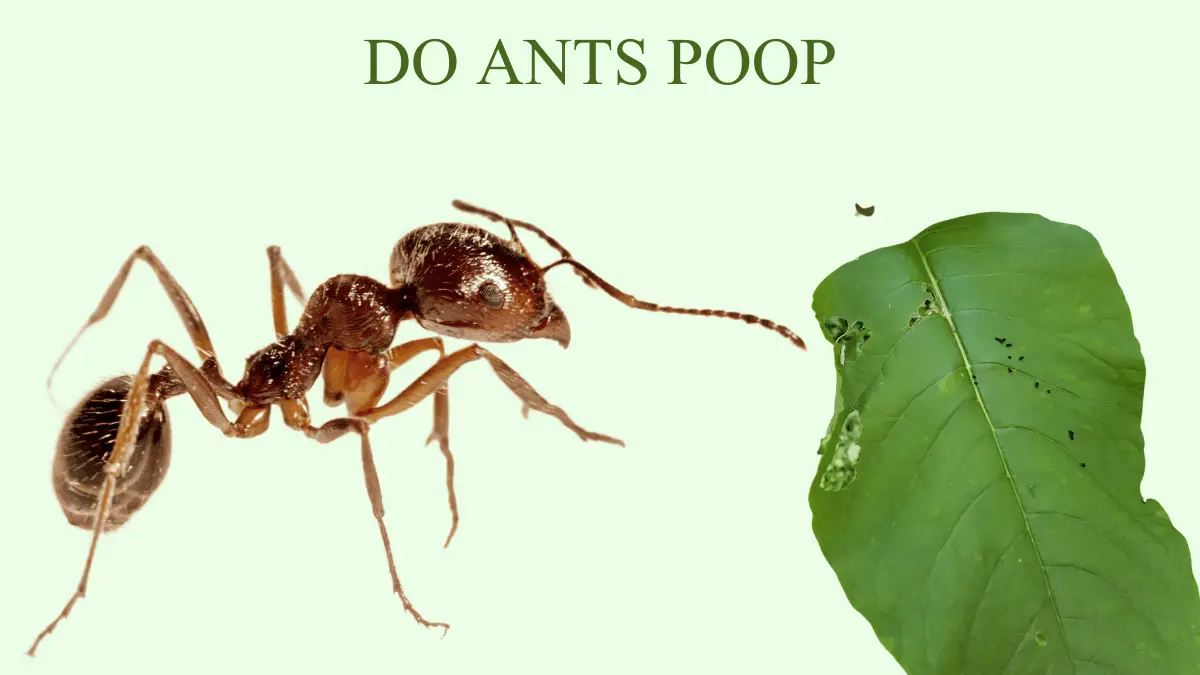Do Ants poop, or ant frass, is an integral part of nature. It has a vital job, even though it might not seem exciting.
Ants are famous for being hardworking and for building complicated colonies.
However, many people don’t know that their poop plays a crucial role in the ecosystem.
Ant poop helps make soil healthy, helps plants grow, and even provides food for other animals.
This article will explain why poop is essential in the natural world and how it affects different ecosystem parts.
Table of Contents
What Ant Poop Is Important?
Do Ants poop, or ant frass, is ants’ waste material.
Ants use poop and other natural stuff during their daily tasks.
Ant poop is very important in the ecosystem, even though it might not seem like it. Breaking down organic matter is helpful because it enriches the soil with nutrients and promotes plant growth.
Ant poop is vital for soil health. It has essential nutrients like nitrogen, phosphorus, and potassium.
These nutrients help plants grow strong and healthy. Plants need these nutrients to grow and develop.
Ants put their poop in the soil. This helps plants grow well because it acts like a natural fertilizer. The poop gives plants the nutrients they need to be healthy.
In addition, ant poop makes the soil better by making it hold more water and helping good microorganisms grow.
The Composition Of Ant Poop
Ant poop comprises different chemicals that help the soil and plants grow better.
Ant poop can change in composition because of different things like the kind of ant and what they eat.
But, it usually has things like plants and animals, rocks and minerals, and helpful tiny living things called bacteria.
Ants eat food, and the organic matter in their poop comes from the food they eat. Ants eat many different things.
They can eat dead insects, plants, and nectar. When animals eat, they break down their food.
Then, they get rid of waste material that still has some food in it. The organic matter makes the soil better and gives food to helpful microorganisms.
Ant poop contains minerals like nitrogen, phosphorus, and potassium.
Plants need these minerals to grow, usually in commercial fertilizers. Ants put their poop in the soil.
This releases minerals that plants can absorb. Using this method can support the growth of plants and make crops produce more.
The Role Of Ant Poop In Ecosystems

Ant poop is very important for keeping ecosystems healthy. Ants put their poop in the soil.
This helps to break down organic matter and release essential nutrients for plants to grow.
Nutrient cycling is a necessary process that helps balance the ecosystem’s nutrients.
Ant poop not only gives nutrients, but it also makes soil structure better. Ant poop contains organic matter that works as a binding agent.
This binding agent helps to hold soil particles together and makes the soil better at holding water.
Improving soil quality is very important, especially in areas where the soil is not good.
It can help make the soil more fertile and make plants grow better.
Ant poop helps the ecosystem stay healthy because it helps good microorganisms grow.
Microorganisms break down organic matter and release nutrients that plants need to grow.
Additionally, they aid in stopping the growth of harmful pathogens, which can shield plants from diseases.
Ant Poop As A Food Source
Many other animals in the ecosystem rely on ant poop as a crucial food source.
Beetles and flies eat and poop because it gives them nutrients.
Birds and mammals, like bats, eat and poop as part of their diet.
These animals benefit from ant poop because it gives them essential nutrients. This helps them grow and develop.
Animals with specialized diets or living in nutrient-poor environments find it especially important.
Some bats depend on ant poop for essential nutrients. They eat nectar and pollen, which don’t have many nutrients.
Ant Poop And Communication
Ants communicate with each other by using their poop.
The ants put their poop in unique places called “fecal middens.”
These middens are like a central station where the ants talk to each other.
Ants can detect and interpret chemical signals in these fecal middens.
Ants mark trails by using their poop. This helps them show where food sources or potential threats are.
Ants also utilize it for marking their territory and communicating with other ants. Ants deposit their poop in specific locations.
This action allows them to leave a chemical trail that other ants can follow.
This activity coordination helps them work together and ensure the colony runs smoothly.
Ants make chemical signals in their poop. These signals are created by glands found in the ant’s abdomen.
The glands release pheromones. Pheromones are special chemicals that can make other ants do certain things.
Ants can communicate important information to other colony members by depositing their poop in specific locations.
This helps them share details about food or potential threats.
The Science Of Ant Poop
Scientists have done a lot of research on ant poop to learn what it can do and how it works.
Scientists have examined the chemical makeup of ant poop, how it helps soil and plants grow, and how it affects the environment.
Scientists are studying the chemical components of ant poop.
They want to understand how these components help soil health and improve plants’ growth.
Scientists studied the nutrients found in ant poop and how plants can use them.
In addition, they have researched how ant poop helps make soil stronger and supports the growth of helpful microorganisms.
Scientists are studying how ant poop helps the ecosystem. Scientists have examined how ant poop helps nutrient cycling and keeps the ecosystem healthy.
Scientists have also studied how changes in ant populations can impact the ecosystem.
They have explored how these changes can affect the soil’s health and plants’ growth.
Ant Poop And Disease

We must be cautious when dealing with it because some dangers may be involved.
Ants transport germs that can make people and animals sick. Ant poop might have germs that can make us sick if we don’t take the proper steps to stay safe.
If you touch ant poop, remember to wear gloves and wash your hands thoroughly afterward.
We can prevent germs and decrease the chances of someone getting sick if we all do these!
You should also ensure not to breathe in any dust or particles in ant poop because that can also be dangerous.
If you touch ant poop and start feeling sick with a fever, diarrhea, or stomach ache, you should immediately see a doctor.
The symptoms might show an infection or illness caused by germs in the ant poop.
How Ant Poop Is Used As Fertilizer And Pest Control
For a long time, farmers have used ant poop in agriculture. People use it as a natural fertilizer and to control pests.
Farmers and gardeners understand that utilizing ant poop is beneficial for the soil and enhances the growth of plants.
Ants make poop that can be used as a natural fertilizer. Plants need essential nutrients to grow.
Farmers use it as a fertilizer. This helps to make the soil suitable for growing plants. It also makes the crops grow more. Additionally, it means that farmers don’t have to use as many fake fertilizers.
Ant poop contains many beneficial microorganisms. Microorganisms stop harmful germs and pests from growing.
Did you know that ant poop has more uses than just being a fertilizer? It can also be used to control pests naturally.
Some ants search for and capture pests such as aphids and caterpillars. Farmers should promote the existence of these ants in agricultural fields.
Using this method can decrease the necessity for chemical pesticides and encourage a more sustainable way to control pests.
Do Ants Poop? How It Impacts The Environment
Ant poop contributes to the health of the environment.
Ant poop is highly beneficial to the environment. It helps plants grow and promotes soil health.
Ants poop, which helps them take carbon dioxide from the air.
Plants get carbon dioxide from the air during photosynthesis and store it in their bodies.
Plants pass away or drop their leaves, giving back carbon to the soil. Ants release poop to break down organic matter and let carbon dioxide enter the atmosphere.
Furthermore, it helps plants develop because they can absorb more carbon dioxide and preserve it in their tissues.
Ant populations significantly affect the ecosystem and can even help cause climate change.
Some ants can break down organic matter and release carbon dioxide more efficiently than others.
Ant populations change, affecting how quickly carbon moves through the ecosystem and gets released into the atmosphere.
Video Of Do Ants Poop
Conclusion
In conclusion, It may not sound exciting, but it is essential. Ant poop helps make soil healthy, helps plants grow, and keeps ecosystems healthy.
Plants need essential nutrients to grow, and soil gives them these nutrients. Soil also helps good microorganisms grow and gives food to other animals.
Understanding why do ants poop is essential, and helps us appreciate how different things in nature are connected.
We can understand how ants and their poop help keep ecosystems healthy. This helps us know what we can do to keep these critical creatures and their homes safe.
Next time you see a bunch of ant poop, stop and think about how it helps in nature.
FAQ.s
Why is it important for ants to remove their waste?
Ants live in highly organized colonies with a division of labor. Maintaining cleanliness within the nest is crucial for the health and well-being of the entire colony.
Accumulation of waste can lead to the spread of diseases and compromise the overall hygiene of the ants’ living environment.
Can ant poop be harmful to humans?
Ant poop is generally harmless to humans. However, avoiding direct contact with ant frass is advisable, especially if you have allergies or sensitivities to insect-related substances.
Can ant poop be used as fertilizer?
Ant frass contains valuable nutrients derived from the ants’ diet.
Ant poop is used as a natural fertilizer in certain gardening practices due to its nutrient-rich composition.
How can I prevent ants from leaving excrement in my house?
To prevent ants from leaving excrement in your house, it is essential to maintain proper cleanliness and prevent ant infestations.
This can be achieved by storing food securely, sealing entry points, and promptly addressing any existing ant colonies.
Do all ant species dispose of their waste in the same way?
Different ant species have varying methods of waste disposal.
Some may eject frass outside the nest, while others have dedicated chambers or storage pits for waste management.
The disposal methods can also depend on the size and structure of the ant colony.
Do ants clean themselves after excreting?
Yes, ants are generally meticulous about their cleanliness.
After excreting, ants use their legs and antennae to groom themselves, removing residual waste and maintaining personal hygiene.
Related Articles
Termites Vs Ants: Top Major Differences Between Both Of Them
Biggest Ant In The World | Top Secrets Of Genus Dinoponera!
Sugar Ant Bites | Tips N Tricks To Treat Them (Proper Guide)
Ant Eggs | How Do I Get Rid Of Ant Eggs? Top Surprising Facts!
